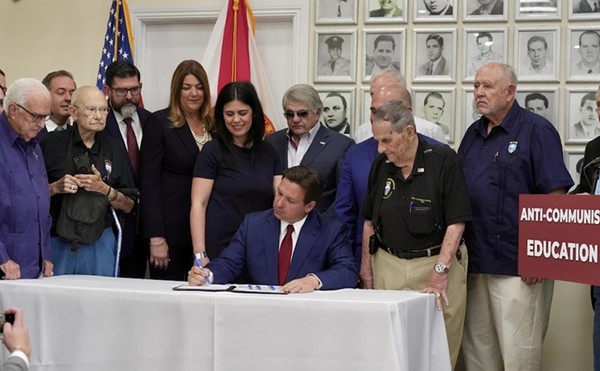Since its public introduction in March, the downtown Eola Capital project has been an uneasy saga for its developers, opponents and the city alike. The proposed 200-foot-tall office high-rise abutting Lake Eola touched the nerves of neighboring residents, who saw it as both an urban eyesore shadowing the natural beauty of Lake Eola Park and a threat to the historic character of its cobblestone-lined surroundings. They pointed out that the 1920s structures that would be bulldozed were relics of local folklore. Those buildings once housed luminaries like citrus magnate George S. Marsh and Nobel Peace Prize—winner John R. Mott. Why would the city allow them to be torn down?
Because they weren't historic; at least, not historic enough to be included in the Lake Lawsona Historic District the city approved in 1994. So they were fair game, and by all appearances, Eola Capital's project was a go.
But as the year progressed, Eola Capital flinched repeatedly and pulled their development plans from two Municipal Planning Board agendas at the last minute. In May, rabble-rousing preservationist Sue MacNamara launched a crusade to have the houses in question designated as historic. A circa-1976 city ordinance (the city couldn't confirm the exact date) said she could do that, even though she held no ownership in the properties.
Except that a 1995 state law overruled that city ordinance, and it seems that although city staffers knew MacNamara's quest never stood a chance, they let her jump through the hoops anyway.
"If we lose those buildings, I've done my job," MacNamara says. "I've done everything that was required of me by `city` code, everything the city has asked me to do. I've done it legally, and I've put a lot of time and effort into it."
In fact, MacNamara didn't learn about this state law until a Sept. 3 Historic Preservation Board meeting. There, city records indicate that after historic preservation officer Richard Forbes recommended approving three of her five historic applications, the legal bombshell was dropped. Those applications were never going to be debated on their merits. Instead, assistant city attorney Kyle Shephard invoked the 1995 Bert J. Harris Act, which prevents municipalities from applying "undue burden" to private property owners. That means that if Eola Capital wants to build, Sue MacNamara can't stand in its way.
"`Shephard` got up there before the public had any say about it, talking about private property rights and how we're going to get sued, and if they voted yes then they were going to put the city at legal risk," she says. "He threatened them is what he did."
Shephard made the same approve-this-or-we'll-get-sued pitch to the Municipal Planning Board Nov. 18. The board voted 9-2 in Eola Capital's favor.
The 1976 city ordinance upon which MacNamara relied is something of an unknown. In May, city economic development director Frank Billingsley told Orlando Weekly, "I didn't know that the process was something we actually had in place, that somebody could apply for landmark designation on property they didn't own."
Since then, city lawyers have apparently realized that you can't. While other states grant municipalities the right to go over the heads of private property owners in designating landmarks, Florida's law protects property owners from just that sort of thing.
"Florida is a super-private property rights state," says city lawyer Karen Consalo. "We're very conservative like that."
Consalo adds that Shephard was not trying to intimidate board members, but merely offering his legal advice. She also says the city ordinance may need to be readdressed.
Of course, the city could have told MacNamara that her mission was futile in the first place, instead of allowing her to wander through a bureaucratic maze. But it didn't.
"It's not just `MacNamara` who's jumping through hoops here," Consalo says. "We're trying to do the right thing by letting her go through the whole process and get to city council. And then city council will have to make the call."
Of course, when MacNamara presents her case to the city council, city lawyers will almost certainly get up and remind commissioners that state law precludes her from doing what she's attempting to do. Should the city decide to go against the Harris Act, Eola Capital could sue, and the city — meaning taxpayers — could be held responsible for the difference between the property's estimated future value and its current value.
Meanwhile, Eola Capital has until February to get the ball rolling if they want their project folded into the next growth- management plan.
"Those houses have been there for 100 years. They've already contributed to the tax base for 100 years. They're a paid asset," says MacNamara. "If we let them go, then we've taken a huge step backwards."



















